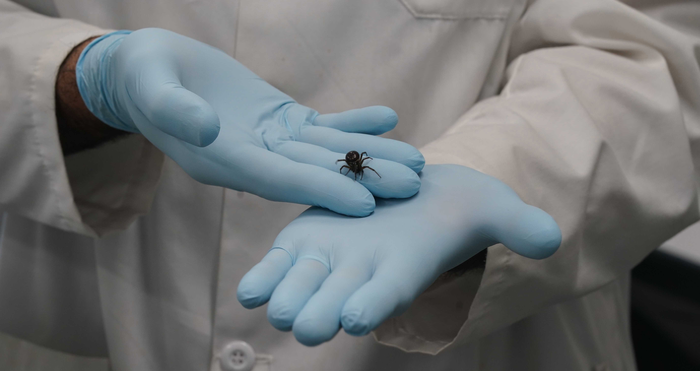Scientists from the Ryan Institute in NUI Galway have published the first record of a Noble False Widow spider feeding on a protected species of Pipistrelle bats in the UK.

Credit: NUI Galway
Scientists from the Ryan Institute in NUI Galway have published the first record of a Noble False Widow spider feeding on a protected species of Pipistrelle bats in the UK.
The new study, published today in the international journal Ecosphere, demonstrates that False Widow spiders continue to impact native species.
It is the first time a member of this family of spiders, called Theridiidae, has been recorded preying on a bat anywhere in the world, or any vertebrate in Britain.
It is also the first time for any species of false widow spider to be recorded preying on mammals.
The extraordinary discovery was made by wildlife artist Ben Waddams at his home in north Shropshire, England. On two consecutive days, bats living in the attic were found entangled on the spider’s web below the entrance to the roost.
The first bat, a young pup, was completely immobilised with its limbs pinned tightly to the torso with silk. It was slightly shrivelled and discoloured from the spider feeding off the remains.
A second, much larger adult bat, was also captured and entangled in the web but as it was still alive, the bat was rescued from the web and released.
In Britain, the Pipistrelle bats are protected under the Wildlife and Countryside Act, 1981, and the Conservation of Habitats and Species Regulations 2017.
The rather grisly event is not as uncommon as people might expect, three years ago the Noble False Widow spider was reported feeding on a protected species of native lizard in Ireland.
Originating from Madeira and the Canary Islands, the Noble False Widow spider Steatoda nobilis has the potential to become one of the world’s most invasive species of spider.
It was first reported in southern England in 1879 and has increased its range and population density in recent decades, spreading northwards towards Scotland and westward through Wales and Ireland. In that time the species has also spread globally from across Europe, East Asia, North America, and South America.
The species is known for its medical significance, having the ability to cause a range of mild to severe symptoms in people who are bitten, but little is known about its impact on native species.
Over the past five years, the team led by Dr Michel Dugon in NUI Galway’s Ryan Institute, have been studying a wide range of characteristics specific to the species including its venom, symptoms after envenomation, ecology and behaviour.
Dr Michel Dugon, Head of the Venom Systems Lab, Ryan Institute, NUI Galway and senior author of the study, said: “We have been working on the Noble False Widow for the past five years, and have learnt a great deal about this species – yet, we are still surprised by its ability to adapt to new environments and make the most of the resources available. It is a truly remarkable species.”
Dr John Dunbar, Irish Research Council Post-Doctoral fellow, Venom Systems Lab, Ryan Institute, NUI Galway and lead author of the study, said: “In more exotic parts of the world, scientists have been documenting such predation events by spiders on small vertebrates for many years, but we are only beginning to realise just how common these events occur. Now that this alien species has become well established in Ireland and Britain, we are witnessing such fascinating events on our very own doorstep.
“Even other, much smaller, species of false widows are known to capture and feed on snakes and lizards. This study presents yet another example of the invasive impact by the Noble false widow spider on native species. We know they are much more competitive than native spiders, and this further confirms their impact on prey species.”
They possess a fast-acting neurotoxic venom with a very similar composition to true black widows that can cause neuromuscular paralysis in terrestrial vertebrates which allows them to occasionally feed on small reptiles and mammals.
Aiste Vitkauskaite, researcher at the Venom Systems Lab, Ryan Institute, NUI Galway, said: “False widow spiders, just as their close relatives’ black widow spiders, have extraordinary prey capture techniques and remarkably potent venom which allows them to capture small vertebrate prey many times larger than the spider itself with surprising ease.
“In the last three years alone, we have observed two occasions of the alien Noble False Widow capturing and feeding on protected species of vertebrate animals in Ireland and Britain. As the Noble False Widow continues to expand its range and increase populations across Ireland and Britain, we should expect to observe similar predation events on small vertebrate animals by this spider, including protected species.”
The team of scientists are encouraging members of the public to email them at [email protected] to report sightings of the Noble False Widow spider.
Read the full study in Ecosphere here: https://esajournals.onlinelibrary.wiley.com/doi/10.1002/ecs2.3959
View a short video about the study here: https://youtu.be/zLOhGfaLrng
-Ends-
Journal
Ecosphere
DOI
10.1002/ecs2.3959
Method of Research
Observational study
Subject of Research
Animals
Article Title
Webslinger vs. Dark Knight First record of a false widow spider Steatoda nobilis preying on a pipistrelle bat in Britain
Article Publication Date
1-Mar-2022




